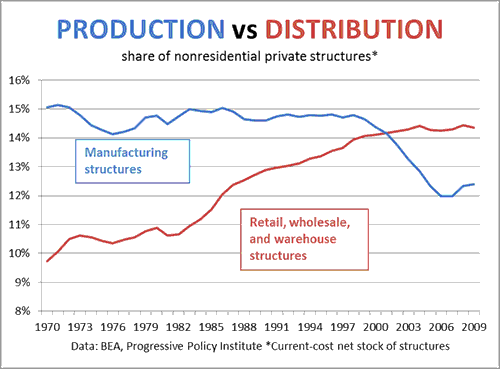In a recent post, I said that the U.S. should be a production economy, not a consumption economy. Matt Yglesias notes that “I have really no idea what that’s supposed to mean, since presumably the idea is to produce goods and services that people want to consume.”
Let me explain: I believe that the U.S. has come to a fork in the road. The direction we’ve been going leads to the the consumption economy, putting more resources into consumption and distribution rather than production. It hasn’t been working for us.
The U.S. needs to change course to a production economy: put more emphasis on investment in physical, human, and knowledge capital, and less on consumption as the yardstick of success. We need to take up our fair share of the global productive burden.
To see one indicator of the consumption economy take a look at this chart.

It tracks the buildings used for manufacturing (production) versus buildings used for retail, wholesale, and warehouses (distribution). Around 2001 the lines crossed, a sign that distribution was becoming more important than production in the U.S. economy.
The goal of a consumption economy is to provide consumers with low prices and wide variety, with less concern about jobs and wages.
In a consumption economy, successful corporations are the ones who can best manage their global networks of suppliers to obtain the lowest costs. Offshoring is a mark of pride, showing that companies can meet the desire of their customers for lower prices.
In theory, a consumption economy can be a great thing. Low prices can presumably bring higher living standards for households, as real wages rise. In theory, production is not an essential component for economic prosperity if you can create the product and organize the production and distribution process.
The great success story for the consumption economy is Apple (AAPL). Apple is a spectacularly profitable creator of innovative products and ecosystems, and a successful retailer to boot. However, the company does not produce any of the products it creates and sells. Creation and distribution, but no production.
However, Apple is Apple. For the rest of us, the consumption economy isn’t working so well.



Leave a Reply